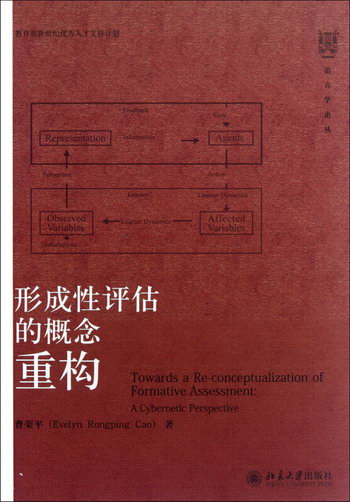
出版社:北京大學 ISBN:9787301208090 商品編碼:1030643397 開本:16 出版時間:2012-07-01 代碼:42 作者:曹榮平
" 基本信息 - 商品名稱:形成性評估的概念重構/語言學論叢
- 作者:曹榮平
- 代碼:42
- 出版社:北京大學
- ISBN號:9787301208090
其他參考信息 - 出版時間:2012-07-01
- 印刷時間:2012-07-01
- 版次:1
- 印次:1
- 開本:16開
- 包裝:平裝
- 頁數:202
- 字數:300千字
編輯推薦語 形成性評估是教育評價研究領域的前沿課題,然而對它的研究近年來出現瓶頸。曹榮平在其作品中指出,突破瓶頸的關鍵在於對形成性評估的理論建構。據此,曹榮平編著的《形成性評估的概念重構》從控制論視角對形成性評估進行了概念重構,繼而推出了以評估和學習之間關繫作為紐帶的形成性評估理論模型。作品的理論貢獻已經引起該領域國際學者的重視,推動了相關研究的發展;作品的寬闊學術視野不僅展現了作者對學習理論、課程理論、(語言)評測理論、繫統論與控制論等跨學科研究領域的基礎理論和專業知識的良好把握,而且指出了形成性評估理論研究的重要導向。 內容提要 曹榮平編著的《形成性評估的概念重構》旨在通過建立一個形成性評估 的理論 模型來彌補形成性評估理論研究的不足。該模型的 認識論基礎是控制論框架下評估和學習之間的關 繫。借鋻控制論有關復雜繫統的思想,《形成性評估的概念重構》推出 的形成性評估模型可用於解釋評估與學習的關繫和 評估的形成性工作機理。該模型視評估為復雜的學 習繫統中的一個復雜的控制繫統。該繫統具開放 性、非預決性和自律性特征。評估的控制性繫統特 質決定了其在學習繫統中的建構作用,評估對學習 的控制由信息反饋來實現。基於控制論思想對評估 的推斷和解釋與現有形成性評估概念在內涵和外延 上有著顯著區別,從而支持了對形成性評估進行概 念重構。
概念重構的意義在於:(1)修正了形成性評 估的內涵和外延;(2)淡化了形成性評估和終結性 評估的對抗性;(3)指出了所有類型評估皆具形成 性意義;(4)指出了評估的雙刃劍特性和評估繫統 的可自律性;(5)指出了正確認識評估繫統,進而 管理好這個復雜繫統的必要性和可行性。
目錄 Introduction
Chapter 1 Assessment and Learning
1.1 The relationships between assessment and learning
1.2 Mastery Learning aligned with Psychometrics
1.2.1 The objectives model of curriculum
1.2.2 Psychometrics
1.3 Learning as a process: Assessment as research
1.3.1 The progressive philosophy of learning
1.3.2 The reconstructionism philosophy of learning
1.3.3 Curriculum design in learning as a process
1.3.4 Teacher as researcher. What about assessment?
1.4 Towards integrating assessment with instruction
1.4.1 The invention of the formative concept
1.4.2 Towards integrating assessment and instruction
1.4.3 Behaviorist connections of the formative concept
1.5 Integrating assessment with learning
1.5.1 The constructivist claim
1.5.2 AlL- Its ups and downs
1.5.3 Advocating AfL
1.6 Chapter summary and discussion
Chapter 2 Re-conceptualization of the formative role of assessment
2.1 Redefining the relationship between FA and SA
2.2 Redefining FA and AlL: Two different visions
2.3 The formative role of assessment: A double-edged sword
2.4 Summary-of the chapter
Chapter 3 Assessment as a cybernetic system
3.1 Revisiting the meta-disciplinary character of cybernetics
3.2 Control and feedback
3.3 The features of assessment as a cybernetic system
3.3.1 Assessment as an open, probabilistic system
3.3.2 Assessment as a complex system
3.3.3 Assessment as a self-regulatory system
3.3.4 The implications of assessment being a cybernetic system
3.4 Linking Chinese philosophy to cybernetics
3.4.1 The Yin-Yang Doctrine
3.4.2 The Doctrine of the Mean
3.4.3 Discussion
3.5 Towards a cybernetic model of assessment
3.5.1 Theoretical assumptions
3.5.2 The model
3.6 Chapter summary
Chapter 4 Accommodating the cybernetic model in China's assessment in education. A historical perspective
4.1 The rationale and research methodology
4.2 A cybernetic understanding of China's assessment system
4.2.1 Major themes in China's ancient assessment history
4.2.2 China's assessment system since 1949
4.2.3 The EFL education
4.3 Discussion
4.3.1 Assessment: A control system
4.3.2 Assessment: A non-deterministic system
4.4 Chapter summary
Chapter 5 Accommodating the model in classroom settings
5.1 Cross-case analysis
5.1.1 A general description of sources of data
5.1.2 Unit of analysis
5.1.3 Issue-based analyses
5.2 Fitting the model in China's EFL tertiary education
5.3 Chapter summary
Chapter 6 Winding up the research
References
Appendices
Appendix 1a Letter of Consent (for the IOE courses)
Appendix 1b Letters for informant review (some samples)
Appendix 2 Sample session notes for Course 2/SPSS
Appendix 3 Lecturer's post-session email to CDD students
Appendix 4 C1 Course materials
Appendix 5 An investigative questionnaire for C1, C2, C3 and C4
" | 



